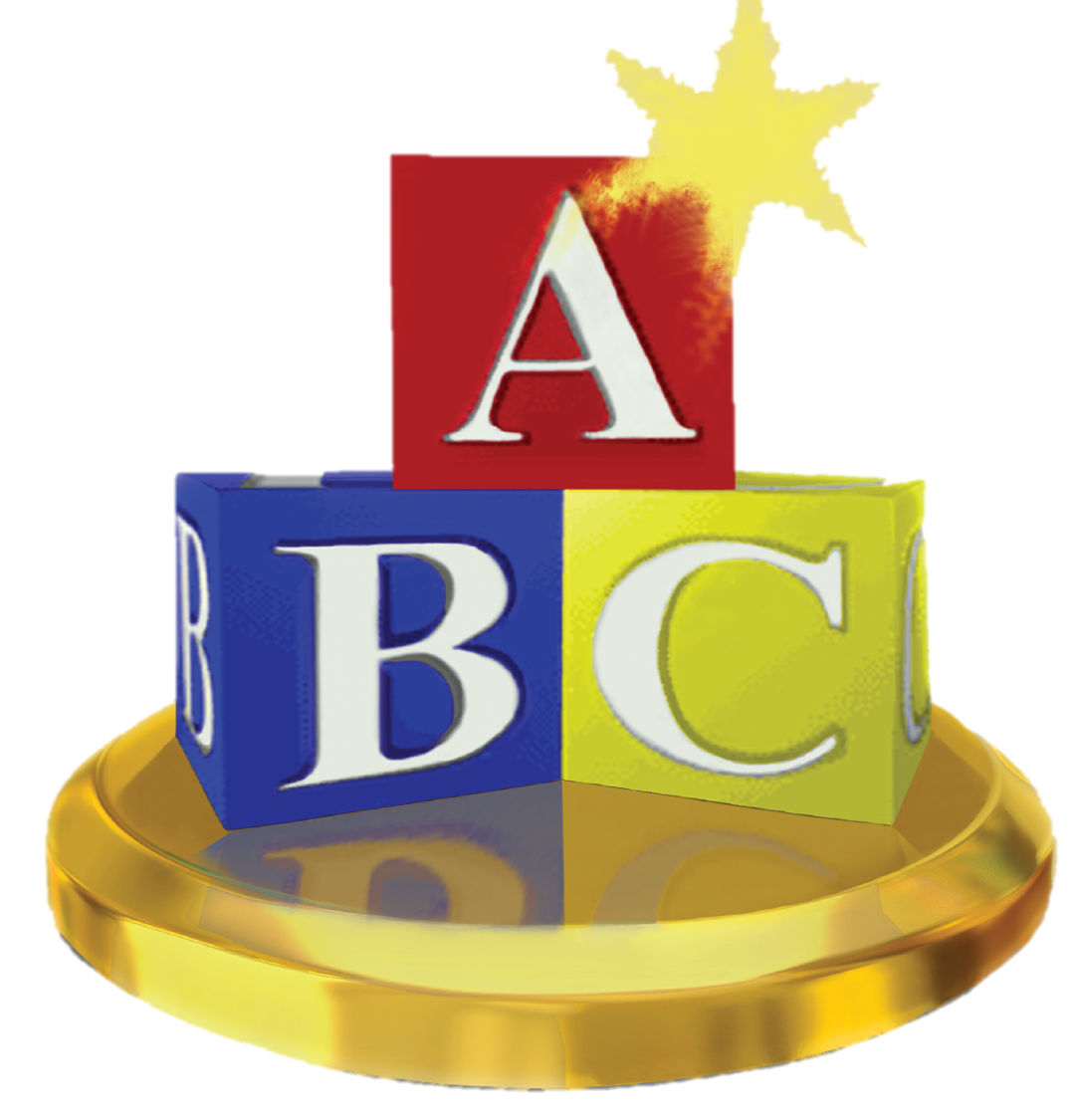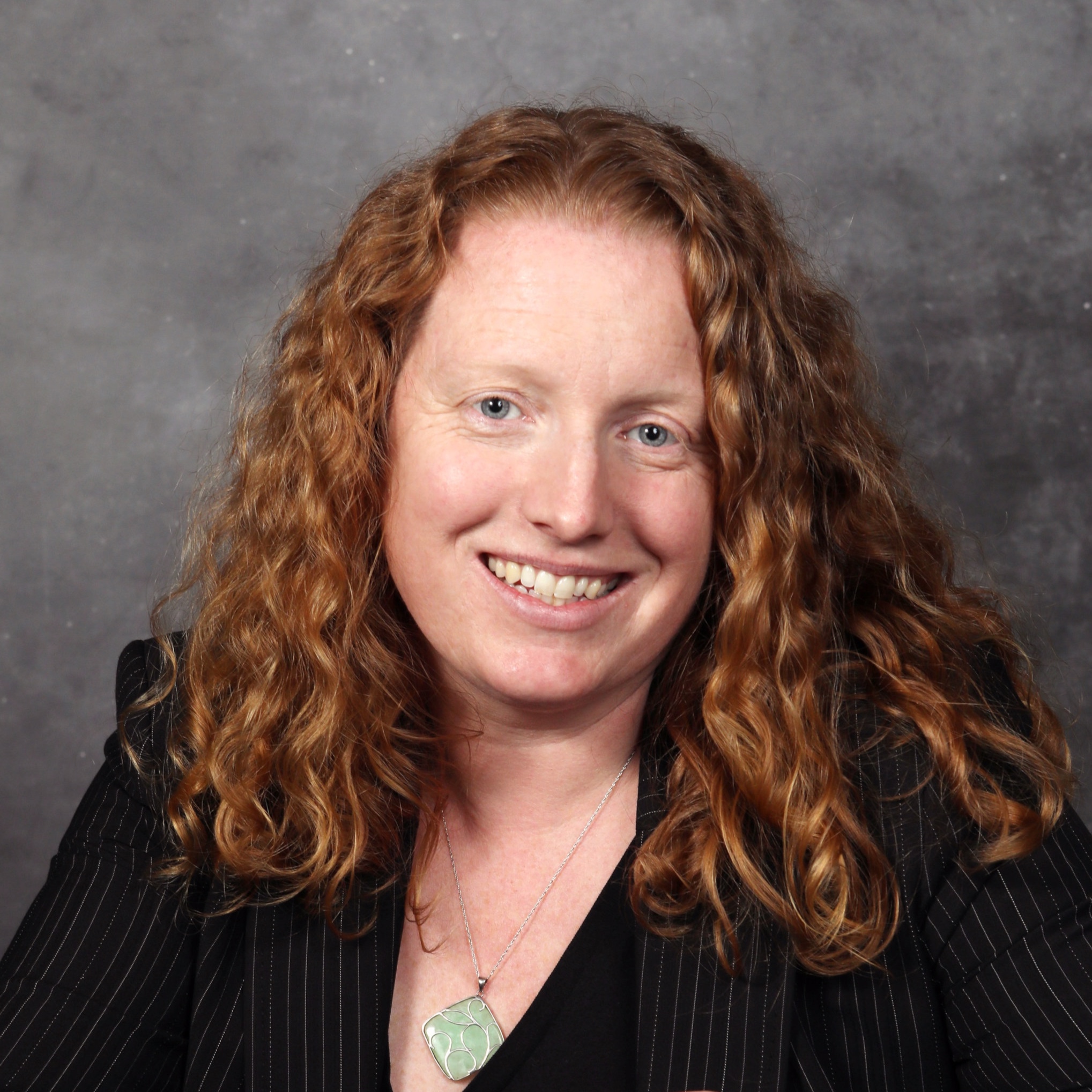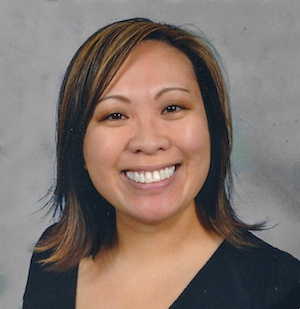
about
Mission
Our mission is to provide cutting edge applied behavior analysis services with compassion for individuals with autism and other developmental disabilities to enhance the quality of their life.
Applied Behavior Consultants, Inc. (ABC) is a human services agency that is dedicated to enhancing the quality of life for people with developmental disabilities and learning disorders. ABC's commitment in the delivery of services is to act with compassion, work from a team approach, and provide what is in the self-interest of every individual and family we serve. We believe we can best serve this mission by operating within the theoretical practices of Applied Behavior Analysis (ABA) derived from the philosophy of behaviorism.
What our mission statement means in practice is that, for every individual receiving ABC services, intervention will be implemented within the following general parameters:
A functional assessment will be performed on all presenting problems, followed by a functional analysis to determine the contextual contingencies, discriminative stimuli, setting events and consequences that effect the behaviors targeted for change.
Treatment procedures will be designed to systematically build in socially significant behaviors, decrease problematic behaviors, and generalize pivotal behaviors to maintain appropriate behavior change.
Although ABC services children and adults with developmental disabilities, ABC specializes in Early Intensive Behavior Intervention (EIBT) for children with Autism, also known as Autism Spectrum Disorder (ASD). The majority of the children ABC serves are under 10 years of age, and receive ABA treatment in a school environment or in the family home.
All ABA programs begin with a comprehensive functional assessment (as described above), including an extensive evaluation of the child's language, play, and social repertoires. The VB-MAPP (Verbal Behavior Milestones Assessment and Placement Program, Sundberg, 2008) or ABLLS (Assessment of Basic Language and Learning Skills, Partington & Sundberg, 1998) tool is used to identify core language deficits that prevent the child from communicating and listening effectively, engaging in basic play, and socializing with peers and adults. For children 0 to 5 years of age, The Carolina Curriculum for Infants and Toddlers or Preschoolers is also used to determine where each child functions developmentally in comparison to same age peers. Skill deficits identified from these assessment tools are then probed within ABC's generalization levels, referred to as R.E.A.L. (Recreating Environments to Accelerate Learning; Terzich, 1996), to determine the level of generalization training necessary to maintain the behaviors in the child's daily repertoires (home, school, community, etc.).
Intervention programs are designed to build the repertoires that are necessary to teach the child to interact with others in a purposeful and meaningful way. Thus, the language repertoire first taught in each child's program is critical communication (Frost & Bondy, 1997) which teaches the child socially appropriate ways to request and initiate his/her wants and needs (mands). All lessons that follow are built upon this foundation of language. When behavior problems arise (excesses), a descriptive and functional analysis (functional assessment) are performed on the behaviors that interfere with the child's learning or jeopardize the safety of the child and/or others. Based on the outcomes of the functional assessment, proactive procedures are developed. Behavior reducing procedures contain preventative strategies; treatment procedures that systematically reduce or eliminate behavior excesses (when needed); and more important, functionally equivalent alternative responses to replace the problem behavior.
Our goal for each person is a more effective, independent and improved quality of life. To effect this end, we are committed to providing our professional staff with the highest level of training and supervision consistent with the cutting edge technology of our field.
Approach
Applied Behavior Analysis, also known as ABA, is the theoretical foundation that underlies all of ABC’s clinical practices and educational development. Each child receives a comprehensive functional assessment that identifies core deficits and excesses interfering with the child’s ability to learn and participate in daily life at home, school and in the community. To play and to be social are crucial aspects of the human experience and are repertoires that many children with autism have extreme difficulty in learning. Thus, deficits in these skills require attention and remediation. To this end, ABC’s intervention includes ways to measure and impact this particularly important facet of a child’s life.
All assessments and development of treatment procedures are performed by qualified staff in Behavior Intervention.
The importance of developmental milestones
Working within the parameters of applied behavior analysis, ABC’s evaluation includes an assessment of the child’s current skill levels guided by standardized developmental milestones including play and social repertoires. This provides a more accurate depiction of where to direct therapy. These milestones are assessed throughout and at the end of intervention. This gives a clearer picture of the effectiveness of the intervention, and in our experience results in greater generalization of the acquired skills needed. Because play and social skills are such an integral part of each child’s program, the same assessment and outcome measures are used to evaluate these types of deficits found in children with autism/ASD and other neurological and behavioral disorders to develop appropriate treatment programs.
Parent involvement and training is core
Parents play a central role in a child’s development. One of our goals is to provide the best guidance, advice and training to ensure a consistent approach in caring for your child in both our center-based and in-home programs. Hence, we have an open door policy where parents can come and observe the programs anytime upon appointment. We also include parent/caregiver training individualized for your specific child’s needs as part of our package. This maximizes the effectiveness of our program for your child.
Language and social skills are priority
The acquisition of language is one of our most primary goals. Communication is a critical aspect to every program and is emphasized throughout. Each child learns to request his or her wants/needs, taught to comment about the world around them, answer questions, imitate the language of others, and eventually read, write and finally to respond in their own words. The rate which these skills are learned are determined by the child’s overall deficits and competing excesses. These repertoires are the bases for interacting in a social world, thus, opportunities to use these language skills spontaneously within a variety of social settings and activities are provided. We use several methods to stimulate language such as PECS (Picture Exchange Communication System) and sign language, particularly, for children who have significant deficits in vocalizing. The focus is on building a functional communication repertoire where the child can request/reject, comment and interact with others. We concurrently teach vocalization to give the child the foundational skills for language development.
Data based analysis is fundamental
Data specific to behaviors of each child is a fundamental basis upon which we create an individualized program. Hence, data of how the child responds is meticulously collected during each session, and this is then analyzed fully - daily, weekly, monthly and quarterly - to determine the child’s rate of improvement, and serve as the guide to determine how to progress the child’s program.
Unique and individualized programs
Each child’s program is uniquely developed for his or her needs. Every child receives a comprehensive functional assessment that identifies core deficits and excesses that impact learning, daily living and family-social life. This is the basis upon which an Intervention Program is individually designed to address each child’s unique needs and learning style. Intervention is continuously adapted as the child’s progresses to higher skill levels
Intervention on advance language
The general focus is on executive function deficits where difficulty with recall, organization and processing information effects everyday interactions with the environment. Intervention may also involve social skills training (individual and group), teaching of self-management and coping skills, problem-solving, as well as, relaxation/desensitization training when needed.
1:1 Child/Adult Ratio
ABC believes in providing a 1 to 1 ratio to ensure appropriate focus is given to each child, especially at the start of a program. Only when a child is ready and can benefit from social interactions do we then enhance the program to enable interaction in pairs or small groups.
Generalization of skills is emphasized
“Every child deserves to flourish and learn in his or her environment.”
To address the difficulties commonly faced in children with Autism when generalizing new skills learned, ABC’s 5 level generalization program was developed in 1996 by Co-founder Brenda Terzich-Garland, referred to as R.E.A.L. (Recreating Environment to Accelerate Learning; Terzich-Garland, 1996). Each child’s assessment and educational program is guided by R.E.A.L. to more successfully generalize learned skills from a highly structured environment to the natural environment. In particular, mands (requests), play and social skills are taught at the beginning and continue to be built upon throughout the child’s intervention and transition into the public school. R.E.A.L. involves moving away from the table to novel situations, rewording requests, adding natural environmental distracters, requiring the skills in daily life routines, and responding to social contingencies while still maintaining the learned behavior. Therapy is guided by ABC's R.E.A.L. program during assessment, treatment development and lesson progression. R.E.A.L. is also used to program the eventual integration of learned skills into the daily life requirements of the child, including relations with the social community.
Positive Programming in ABA intervention for behavior problems
To address serious behavior problems that often prevent children from learning new skills or maintain existing appropriate behaviors, ABC uses Positive Programming procedures (also written into the Hughes Bill, AB2586). With this technology, a descriptive analysis is performed and a functional analysis is made of the behavior.
In other words, we analyze the environmental antecedents and consequences to see what is evoking the problem behavior or what the student gets out of the behavior. Intervention plans are developed based on the outcome of the functional analysis, and continue throughout the intervention to determine the effectiveness of the procedure in reducing the problem behavior. Many problem behaviors are prevented by extinction and/or redirection and can suffice to solve the situation. Others are easily decreased by teaching alternative functional behaviors to replace those that serve to get attention or escape such as calling the person’s name or asking for a break. Overall, we believe problem behavior is a result of poor environmental contingencies, and it is these contingencies we change rather than try to suppress behavior with punishment.
who we are
History
For over 30 years ABC has provided ABA services to the community serving individuals with Autism/Autism Spectrum Disorder (ASD) and other developmental disabilities. From early beginnings with Behavior Intervention Services, ABC has embraced the ideal that the parent(s) are the child's first teacher(s) (Baker and Brightman, 1994) which launched our Positive Programming for Parents group parent training programs. Coming from this perspective of empowering parents, ABC’s roots lie in a “trainer to trainer” model where training others would result in effective ABA programming for individuals with special needs. From this precept, ABC has developed an extensive number of programs to meet the growing needs of all individuals with disabilities and Autism/ASD.
With the diagnosis of Autism/ASD rising, ABC has developed services to meet that challenge in several locations throughout California (Sacramento, Central Valley, Bay Area, North and South East Los Angeles).
ABC developed consultation for individuals with Prader-Willie Syndrome in 1987 and a Care Provider Training Series (CPTS) for Care Homes a year later. In 1990, ABC started its first in-home Autism programs in the Sacramento region. In 1994, we began our first Non-Public School (NPS) for children with Autism/ASD in Sacramento and eventually in Duarte and Ontario. In 2006-2007, ABC started its Infant-Toddler programs in Duarte, Central Valley, and Sacramento. We now have opened site based Early Intensive Behavior Treatment Programs in Stockton and Sacramento.
Internationally, ABC has been successful in disseminating ABA in Europe, Asia and Africa. These services include consultation, and setting up in-home ABA programs and behavioral schools in China, Portugal and Bahrain. We continue with our effort in spreading ABA to all who need the technology world wide.
ABC, Inc. is founded by Joseph E. Morrow and Brenda Terzich-Garland and vendorized with Alta California Regional Center to provide behavioral services.
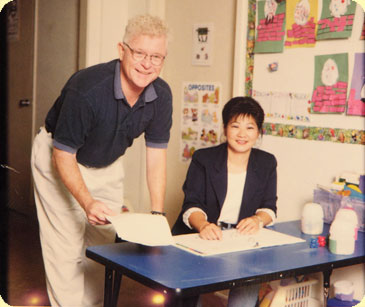
ABC starts our first in-home program in the Sacramento region.

ABC School opens and is accredited by the California Department of Education.
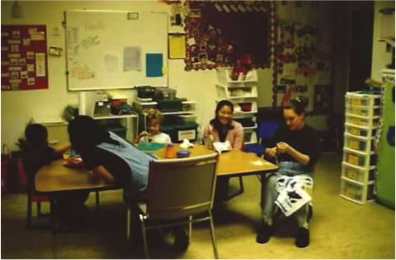
ABC expands to Central Valley.
ABC expands to Southern California, the East Bay, and China.
ABC opens centers in Portugal, Singapore, and the Phillippines.
Per SB 946, ABC begins working with insurance companies in the state of California.
In 2020, Brenda Terzich-Garland authored, The R.E.A.L. Model™, Rethinking Generalization (Different Roads to Learning, New York, New York). This publication is the foundation for all of ABC’s clinical programming. At it’s core we plan for generalization using Terzich-Garland’s (2020), approach to increase learning across all clients at ABC. Also, in 2020, Brenda Terzich-Garland was named President and CEO of Applied Behavior Consultants, Inc.
Team
Founders
Brenda Terzich-Garland
Joseph Morrow
Chief Officers
Executive Staff
Not pictured: Susan Riggs-Wright, MA, MFT, BCBA, BICM, Clinical Administrator (Central Valley)
Videos
Get to know the Co-Founders
ABC featured in the Viewpoint Project
Results
Consistent with over 40 years of scientific data from the field of Applied Behavior Analysis, ABC Inc. finds that all children in our care make progress with ABA.
100% of children in our program are effectively communicating their wants and needs within one year, either vocally and/or by PECS, and sometimes ASL (American Sign Language) or other types of language assisted devices.
90% are eventually transitioned to either a mainstream or special education school.
If ABA is started at an early age, a significant number is transitioned to attending regular school with same age peers
Some results can only be described as spectacular. Consistent with the findings of Ivar Lovaas, Patricia Krantz, Lynn McClannahan and others, we find that some of our students can attend regular education classrooms with same age peers. Our in-home programs show similar outcomes.
"In the first four years of providing school services ABC had nine students who came to us before the age of four years and one month who reached this criterion and were placed in regular education programs without supports. They continue to succeed in those placements."
While several of our intensive in-home clients have become indistinguishable from same age peers, we are currently analyzing these datum for a more objective analysis.
The amount of gain that a child makes from the age the child starts the Infant Toddler program until they reach age 3 can be seen on the Outcome Research Posters.
Comparison of Video Modeling and Script Prompting for Pretend Play Scripting
NEW Course: Rethinking Generalization with The R.E.A.L. Model
BACB CEU course taught by ABC’s co-founder and President, Brenda Terzich-Garland. This course is worth 28.5 BACB Learning CEUs and covers everything about using ABC’s signature method, The R.E.A.L. Model, to teach for generalization in ABA. On sale for $299 — limited time only — purchase here!
